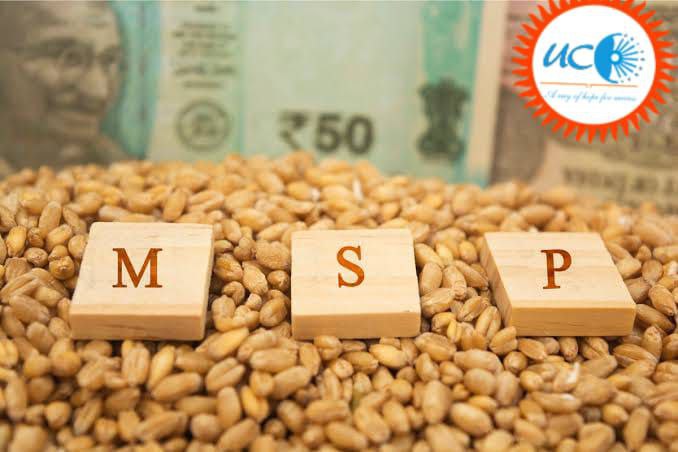Discuss the rationale behind declaring Minimum Support Price (MSP) and various issues related to MSP regime in the country. Do you think that providing legal backing to MSP is necessary and sufficient for making farming financially sustainable?
Approach:
- Introduce by defining MSP. In the body, discuss various reasons for declaring MSP.
- Next, discuss issues related to the MSP regime in India.
- Lastly discuss the benefits and limitations of the proposal for giving legal backing to MSP in tabular format.
- Conclude with the need for progressive measures to reform the MSP regime.
Minimum Support Price (MSP) is the rate at which the government purchases certain crops from farmers. MSP is decided based on the recommendations of the Commission for Agricultural Costs and Prices (CACP).
The rationale behind declaring MSP is as under:
- It protects the farmer from unwarranted fall in prices which results in distress sales, such as due to market volatilities.
- It helps in ensuring food security as assured procurement at MSP acts as incentive for cultivation.
- Developmental schemes such as PM-POSHAN, Anganwadi Services Scheme, TPDS, etc. are supported through grains procured by Food Corporation of India (FCI) at MSP. Distribution of affordable food under TPDS helps reduce extreme poverty.
- Diversification of crops is targeted through MSP for 23 crops under the MSP system. E.g., Ragi, Bajra, Soyabean etc.
- MSP is used as a device to reduce import-dependence and food inflation. E.g., highest increase in MSP for pulses and oilseeds in 2021.
The various issues related to MSP-regime are as follows:
- Subsidies for MSP create a fiscal burden for the government. Trade-distorting nature of subsidiescreate challenges in trade negotiations at WTO and deter private investments in the agriculture sector.
- It incentivises cropping patterns which are not suited for agroclimatic zones, leading to ecological harm. E.g., depleting water-table in Punjab due to paddy cultivation.
- Bias towards wheat and rice in FCI’s procurement leads to neglect of other crops under MSP which are sold at below-MSP prices.
- Poor land allocation for crops like oilseeds and pulses results in import-dependence in edible oil and protein-based inflation, respectively.
- Only 14 per cent of land-owning farmers benefit from MSP. Smaller farmers face poor price realisation due to cartelisation of middlemen.
- The MSP-regime, enacted in the era of food shortages, is ill-suited to address current priorities in agriculture such as stability in food production, fragmentation of land, lack of investments etc.
Importance of legal backing for MSP in making farming financially sustainable:
Positive Role Limitations
- Legalizing MSP will give farmers the right to claim MSP with enforcement through courts.
- It can help improve price realisation for farmers from the private sector. This wouldimprove the rural economy.
- Farmers can avoid burden of high input costs of select crops, through diversificationtowards any of the 23 MSP crops.
- Production of pulses and millets could increase, helping to usher in climate-smartagriculture.
- Increased litigation and judicial burden.
- Inflation due to higher procurement cost.
- It may result in evaporation of private sector purchases. Along with limited storage capacity at FCI, it could create food insecurity.
- Poor export competitiveness due to high cost of production and poor yield; global trade hurdles for amber-box subsidies.
- Open-ended procurement for all crops is not possible due to unsustainable subsidyrequirements. Rs. 5.4 lakh crore is needed to purchase just 10% output of 23 MSP crops.
- Problems like small farms, disguised unemployment, lack of investments andinfrastructure are main reasons for agrarian distress. MSP doesn’t address these issues.
Legal backing for MSP is neither sufficient nor necessary for making farming financially sustainable. Solutions such as income-support (PM-KISAN, KALIA, Rythu Bandhu etc.) or price deficiency systems (PM-AASHA) provide more progressive solutions. The MSP-regime needs an overhaul, but there is also need for sectoral reforms in agriculture and beyond









